定语从句介词用法
定语从句介词知识点总结

定语从句介词知识点总结介词在定语从句中的使用分为两种情况:一种是介词前置,即介词位于定语从句中引导词的前面;另一种是介词后置,即介词位于定语从句中引导词的后面。
在具体的语境中,要根据不同的情况选择恰当的介词,并确保介词的使用符合语法规则。
一、介词前置情况1. 时间介词的前置在定语从句中,表示时间的介词如at, on, in等通常放在从句的先导词之前。
例如:The day when we met for the first time is still vivid in my memory.(我们第一次见面的那一天在我的记忆中依然清晰)I will never forget the moment when I held my baby for the first time.(我永远不会忘记我第一次抱着我的宝宝的那一刻)2. 原因介词的前置表示原因的介词如because of, due to等也通常放在定语从句中引导词的前面。
例如:The reason why she didn't come to the party is because of her illness.(她没来参加派对的原因是因为生病了)The failure of the project was due to the lack of funding.(这个项目的失败是因为资金不足)3. 地点介词的前置在表示地点的定语从句中,介词如in, at, on等也通常放在引导词的前面。
例如:The place where we met for the first time is now a bustling shopping mall.(我们第一次见面的地方现在成了一个繁华的购物中心)I will never forget the city where I spent my childhood.(我永远不会忘记我度过童年的那座城市)4. 其他介词的前置除了表示时间、原因、地点的介词外,其他表示方式、比较、程度等概念的介词也通常放在定语从句中引导词的前面。
定语从句 知识讲解 “介词+关系代词”的用法
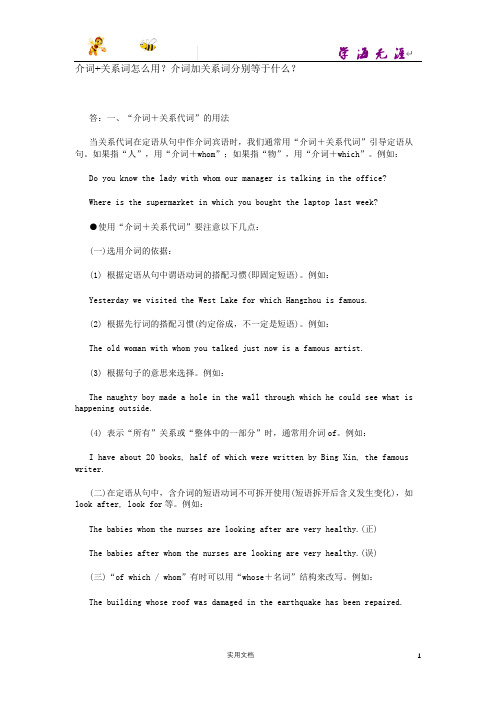
介词+关系词怎么用?介词加关系词分别等于什么?答:一、“介词+关系代词”的用法当关系代词在定语从句中作介词宾语时,我们通常用“介词+关系代词”引导定语从句。
如果指“人”,用“介词+whom”;如果指“物”,用“介词+which”。
例如:Do you know the lady with whom our manager is talking in the office?Where is the supermarket in which you bought the laptop last week?●使用“介词+关系代词”要注意以下几点:(一)选用介词的依据:(1) 根据定语从句中谓语动词的搭配习惯(即固定短语)。
例如:Yesterday we visited the West Lake for which Hangzhou is famous.(2) 根据先行词的搭配习惯(约定俗成,不一定是短语)。
例如:The old woman with whom you talked just now is a famous artist.(3) 根据句子的意思来选择。
例如:The naughty boy made a hole in the wall through which he could see what is happening outside.(4) 表示“所有”关系或“整体中的一部分”时,通常用介词of。
例如:I have about 20 books, half of which were written by Bing Xin, the famous writer.(二)在定语从句中,含介词的短语动词不可拆开使用(短语拆开后含义发生变化),如look after, look for等。
例如:The babies whom the nurses are looking after are very healthy.(正)The babies after whom the nurses are looking are very healthy.(误)(三)“of which / whom”有时可以用“whose+名词”结构来改写。
定语从句引导词的用法

定语从句引导词的用法
一、that的用法
1 、在定语从句中,that 引导的定语从句,在句中作宾语或状语。
① 作宾语:
We discussed something about the plan 〔that〕we thought was realistic.
我们讨论了一些我们认为现实可行的关于计划的事情。
他工作很努力,几乎未能把所有工作做完。
2、在含有介词的定语从句中,that 几乎不用,介词后面直接接定语从句。
这就是她从哪里获得资金的原因。
他找到了他要找的钥匙。
这就是她曾经工作的那栋建筑物。
三、whose的用法
1、whose 引导定语从句,其意思是“…的”,它只能指人,一般在句中作定语。
头发乱糟糟的女孩走进了房间。
2、whose 也可以替代 of which 来引导定语从句,但只能用于某些句型中。
He is the teacher 〔whose〕books I read.
他就是我读过书的老师。
定语从句介词加关系代词用法

定语从句介词加关系代词用法在定语从句中,介词加关系代词的用法如下:1.关系代词在介词前:当关系代词作为定语从句的主语时,介词通常放在关系代词的前面。
例如:- The man whom I spoke to is my boss.(我与之交谈的那个人是我的老板。
)- The book that I am looking for is on the table.(我要找的那本书在桌子上。
)2.关系代词在介词后:当关系代词作为定语从句的宾语时,介词通常放在关系代词的后面。
例如:- The house which he lives in is very old.(他住在的那栋房子很旧。
)- The car that she is interested in is not available.(她感兴趣的那辆车不可用。
)需要注意的是,当介词后的关系代词是which时,可以省略介词。
例如:- The city which I was born in is famous for its architecture.(我出生的那座城市以其建筑而闻名。
)- The city I was born in is famous for its architecture.(我出生的那座城市以其建筑而闻名。
)同时,也可以通过适当拓展定语从句来提供更多信息:- The man whom I spoke to yesterday, in the cafe near my office, is my boss.(昨天我在我办公室附近的咖啡馆里与之交谈的那个人是我的老板。
)- The book that I am looking for, which is a bestseller,is on the table.(我正在找的那本畅销书就在桌子上。
)。
定语从句介词提前用法

定语从句介词提前用法定语从句是英语中非常重要的一种语法结构,它可以用来修饰名词或代词,进一步描述或限定其所指的对象。
而介词提前则是定语从句中常用的一种表达方式,它可以使句子更加简洁明了,也更符合英语语言的表达习惯。
介词提前的用法可以通过以下例句来理解:1. The book on the table, which I borrowed from the library, is very interesting.这句话中,介词on被提前到定语从句的开头,修饰名词table。
定语从句的主语是I,谓语是borrowed,关系代词which指代的是book。
2. The girl in the red dress, whom I met yesterday, is my new neighbor.这句话中,介词in被提前到定语从句的开头,修饰名词dress。
定语从句的主语是I,谓语是met,关系代词whom指代的是girl。
3. The man with the beard, whose car was stolen, reported thetheft to the police.这句话中,介词with被提前到定语从句的开头,修饰名词beard。
定语从句的主语是car,谓语是was stolen,关系代词whose指代的是man。
通过以上例句可以看出,介词提前的用法可以使定语从句更加简洁明了,同时也可以使句子的语气更加自然流畅。
在实际应用中,我们可以根据需要灵活运用介词提前的用法,使句子更加优美。
除了介词提前,定语从句还有其他的表达方式,比如关系代词的省略、关系代词的替换等。
在使用定语从句时,我们需要注意以下几点:1. 关系代词的选择:在定语从句中,关系代词的选择要根据其在从句中所扮演的角色来确定。
比如,主语要用who或that,宾语要用whom或that,所有格要用whose等。
2. 关系代词的位置:在定语从句中,关系代词的位置要放在从句中所修饰的名词或代词之后,这样才能清晰地表达出其所指代的对象。
定语从句介词
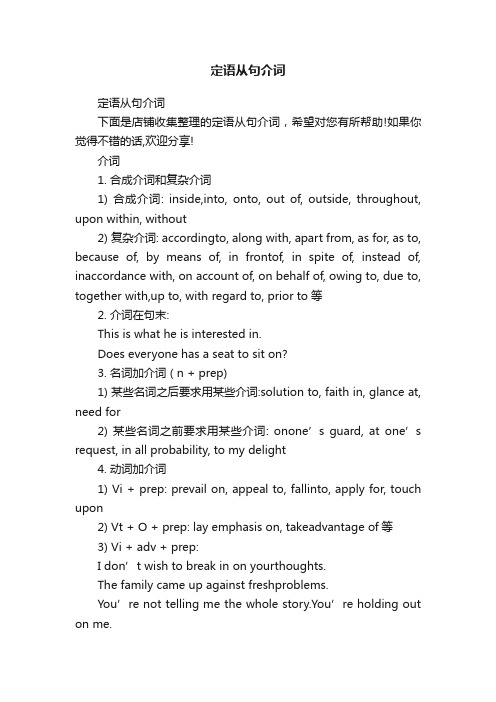
定语从句介词定语从句介词下面是店铺收集整理的定语从句介词,希望对您有所帮助!如果你觉得不错的话,欢迎分享!介词1. 合成介词和复杂介词1) 合成介词: inside,into, onto, out of, outside, throughout, upon within, without2) 复杂介词: accordingto, along with, apart from, as for, as to, because of, by means of, in frontof, in spite of, instead of, inaccordance with, on account of, on behalf of, owing to, due to, together with,up to, with regard to, prior to等2. 介词在句末:This is what he is interested in.Does everyone has a seat to sit on?3. 名词加介词 ( n + prep)1) 某些名词之后要求用某些介词:solution to, faith in, glance at, need for2) 某些名词之前要求用某些介词: onone’s guard, at one’s request, in all probability, to my delight4. 动词加介词1) Vi + prep: prevail on, appeal to, fallinto, apply for, touch upon2) Vt + O + prep: lay emphasis on, takeadvantage of等3) Vi + adv + prep:I don’t wish to break in on yourthoughts.The family came up against freshproblems.You’re not telling me the whole story.You’re holding out on me.She got off with him soon after she beganto work at the institution.4) Vt + O + adv +prep:You shouldn’t take your resentment out onme.We shouldn’t put the shortage down to badplanning.5. 形容词加介词about --- anxious, careful, careless,certain, considerate, enthusiastic, guilty, happy, mad, particular, sad, sure,timid, unhappy, etcat--- awkward, bad, clever,disappointed, disgusted, good, marvellous, quick, skilful, skilled, useless,weak, etcfor---convenient, eligible, grateful,homesick, hungry, necessary, noted, perfect, responsible, etc from --- evident,exempt, inseparable, safe, tired, etcin --- deficient, expert, liberal, quick,rich, successful, weak, etcof --- apprehensive, characteristic,critical, destructive, envious, hard, inconsiderate, impatient, dependent,jealous, positive, scared, sensible, short, sick, suspicious, typical, worthy,etcon ---dependent, keen, intent, etcto --- acceptable, accessible, agreeable,alive, attentive, blind, comparable, courteous, deaf, destructive, essential,favourable, hostile, indifferent, married, obedient, parallel, preferable,related, responsible, sensitive, suitable, unjust, etcwith --- awkward, bored, careful,disappointed, generous, identical, ill, impatient, popular, sick, wrong, etc定语从句1. 限制和非限制性定语从句:限制性定语从句是名词词组不可缺少的一个组成部分, 去掉了会造成病句或意义不明确; 非限制性定语从句属于补充说明性质, 去掉了不会影响主要意义, 通常用逗号与它的先行词分开.The boys who wanted to play football were disappointed when it rained.The boys, who wanted to play football, were disappointed when it rained.如果定语从句的先行词是专有名词, 或是带有形容词性物主代词(my, his, etc)或形容词性指示代词(this, that, etc)作限定词, 其后的定语从句通常都是非限制性的: Mary Smith, who is in the corner, wants to meet you.Her mother, who had long suffered form arthritis, died last night.All these books, which have been donated by visiting professors, are to be used by the postgraduates.在非限制性定语从句中只能用who/whom指人, 用which指物,通常不用that替代.My father, who had been on a visit to America, returned yesterday.All the books, which had pictures in them, were sent to the little girl.2. 定语从句的引导词1) that, who, whom: 非限制性定语从句, 如果修饰人, 一般用who,有时用that (作主语时用who较多). 如果关系代词在从句中作宾语, 就应当用宾格 whom 或that,但在大多数情况下都可以省略掉, 在口语中可用who代替whom.Here is the man (whom) you’ve been looking for.He is a man (that) you can safely depend on.The people (who/that) you were talking to were Swedes.There are some people here who I want you to meet.但在介词后只能用whom:This is the man to whom I referred.但在口语中一般都把介词放到句子后面去, 这时可用that, 但省略时更多一些.Have you met the person about whom he was speaking?Have you met the person (that) he was speaking aboutThe girl to whom I spoke is my cousin.The girl (who/that) I spoke to is my cousin.2) 限制性定语从句如果修饰“物”, 用关系代词that的时候较多, 也有时用which..当这个代词在从句中是用作宾语时, 在绝大多数情况下都是省略的, 特别是口语中(尤其是当被修饰的词是all, everything等词时):Have you everything you need?(Is there) anything I can do for you?All you have to do is to press the button.在介词后只能用which, 在口语中一般都把介词放到从句后部去, 这时可以用that, 但省略的时候更多一些:The tool with which he is working is called a wrench.The tool (that) he is working with is called a wrench.This is the question about which we’ve had so much discussion.This is th e question (that) we’ve had so much discussion about.定语从句一般是修饰名词或代词的, 但间或也可以修饰整个句子a), 或是句子的.一部分b), 引导词用which:a) They have invited me to visit their country, which is very kind of them.The activity was postponed, which was exactly what we wantedb) When deeply absorbed in work, which he often was, he would forget all about eating and sleeping.She was very patient towards the children, which her husband seldom was.3) whose: 在表示“...的”这个概念时, 可用所有格 whose; whose 用于指物, 有时可与of which交替使用, 通常的词序是名词词组 + of which:Is there anyone in your class whose family is in the northeast?We had a meeting whose purpose was completely unclear. (…the purpose of which was…) He’s written a book the name of which I’ve completely forgotten. (…whose name I’ve…) of which前的名词词组也可以由some, any, none, all, both, several, enough, many, most, few以及基数词担任; 这些词也能用在of whom之前.The buses, most of which were already full, were surrounded by an angry crowd.It’s a family of eight children, all of whom are studying music.4) 关系副词 when, where, why: 它们的含义相当于 at which, in which, for which, 因此它们之间有交替使用的可能.The day when he was born…on which he was born…which he was born on…The office where he works…at which he works…which he works at…有时可用that替代关系副词, 在口语中that可省略.Every time (that) the telephone rings, he gets nervous.This was the first time I had serious trouble with my boss.Do you know anywhere (that) I can get a drink?This is the place (where) we met yesterday.That is the reason (why) he did it.在the way 后也可用that 替代in which, 在口语中that也可省略.This is the way (that/in which) he did it.That’s the way I look at it.3. 如果定语从句中谓语为there is, 作主语的关系代词也常可省掉:I must make full use of the time there is left to me and do as much as I can for the people.This is the fastest train (that) there is to Nanjing.4. 定语从句的简化: 定语从句与不定式结构, -ing分词结构, -ed分词结构以及无动词分句等有着转换关系.He was the only one to realize the danger (= who realized the danger).The woman driving the car (= who was driving the car) indicated that she was going to turn left. The man injured by the bullet (= who was injured by the bullet) was taken to hospital.All the women present (= who were present) looked up in alarm.【定语从句介词】。
介词定语从句
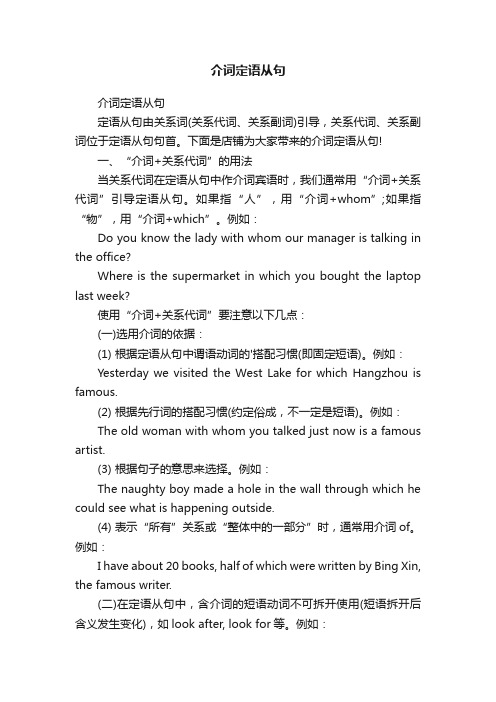
介词定语从句介词定语从句定语从句由关系词(关系代词、关系副词)引导,关系代词、关系副词位于定语从句句首。
下面是店铺为大家带来的介词定语从句!一、“介词+关系代词”的用法当关系代词在定语从句中作介词宾语时,我们通常用“介词+关系代词”引导定语从句。
如果指“人”,用“介词+whom”;如果指“物”,用“介词+which”。
例如:Do you know the lady with whom our manager is talking in the office?Where is the supermarket in which you bought the laptop last week?使用“介词+关系代词”要注意以下几点:(一)选用介词的依据:(1) 根据定语从句中谓语动词的'搭配习惯(即固定短语)。
例如:Yesterday we visited the West Lake for which Hangzhou is famous.(2) 根据先行词的搭配习惯(约定俗成,不一定是短语)。
例如:The old woman with whom you talked just now is a famous artist.(3) 根据句子的意思来选择。
例如:The naughty boy made a hole in the wall through which he could see what is happening outside.(4) 表示“所有”关系或“整体中的一部分”时,通常用介词of。
例如:I have about 20 books, half of which were written by Bing Xin, the famous writer.(二)在定语从句中,含介词的短语动词不可拆开使用(短语拆开后含义发生变化),如look after, look for等。
例如:The babies whom the nurses are looking after are very healthy.(正)The babies after whom the nurses are looking are very healthy.(误)(三)“of which / whom”有时可以用“whose+名词”结构来改写。
定语从句中介词加关系代词的用法
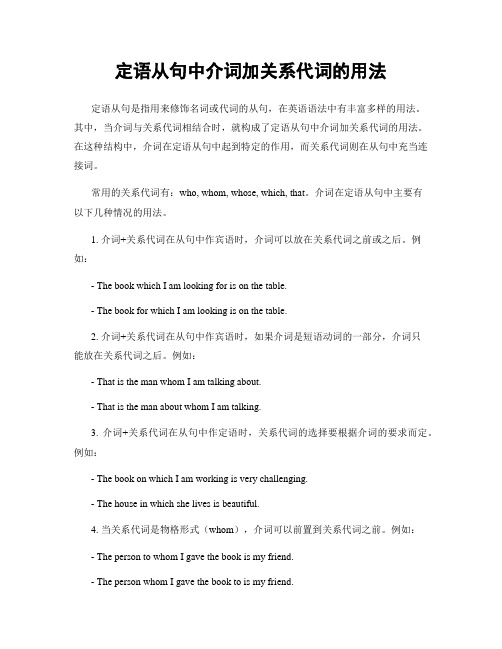
定语从句中介词加关系代词的用法定语从句是指用来修饰名词或代词的从句,在英语语法中有丰富多样的用法。
其中,当介词与关系代词相结合时,就构成了定语从句中介词加关系代词的用法。
在这种结构中,介词在定语从句中起到特定的作用,而关系代词则在从句中充当连接词。
常用的关系代词有:who, whom, whose, which, that。
介词在定语从句中主要有以下几种情况的用法。
1. 介词+关系代词在从句中作宾语时,介词可以放在关系代词之前或之后。
例如:- The book which I am looking for is on the table.- The book for which I am looking is on the table.2. 介词+关系代词在从句中作宾语时,如果介词是短语动词的一部分,介词只能放在关系代词之后。
例如:- That is the man whom I am talking about.- That is the man about whom I am talking.3. 介词+关系代词在从句中作定语时,关系代词的选择要根据介词的要求而定。
例如:- The book on which I am working is very challenging.- The house in which she lives is beautiful.4. 当关系代词是物格形式(whom),介词可以前置到关系代词之前。
例如:- The person to whom I gave the book is my friend.- The person whom I gave the book to is my friend.需要注意的是,在口语中,人们往往更倾向于使用介词后置的形式,即将介词放在关系代词后面。
同时,有时候可以使用介词+which来替代介词+关系代词的结构,这种形式更加简洁。
定语从句“介词+关系代词+不定式”用法-初中英语语法
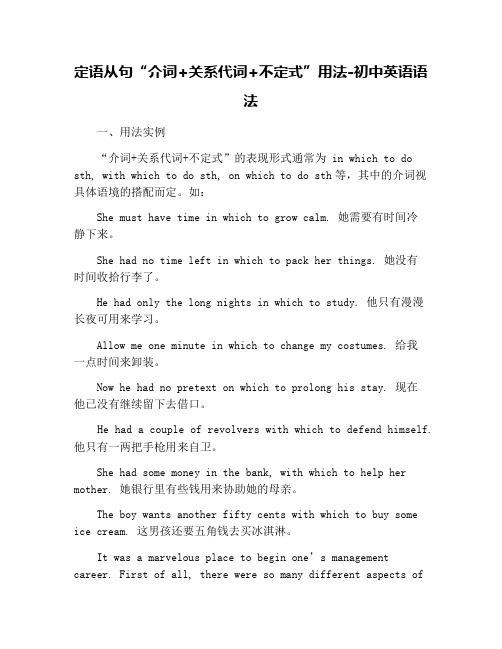
定语从句“介词+关系代词+不定式”用法-初中英语语法一、用法实例“介词+关系代词+不定式”的表现形式通常为 in which to do sth, with which to do sth, on which to do sth等,其中的介词视具体语境的搭配而定。
如:She must have time in which to grow calm. 她需要有时间冷静下来。
She had no time left in which to pack her things. 她没有时间收拾行李了。
He had only the long nights in which to study. 他只有漫漫长夜可用来学习。
Allow me one minute in which to change my costumes. 给我一点时间来卸装。
Now he had no pretext on which to prolong his stay. 现在他已没有继续留下去借口。
He had a couple of revolvers with which to defend himself. 他只有一两把手枪用来自卫。
She had some money in the bank, with which to help her mother. 她银行里有些钱用来协助她的母亲。
The boy wants another fifty cents with which to buy some ice cream. 这男孩还要五角钱去买冰淇淋。
It was a marvelous place to begin one’s management career. First of all, there were so many different aspects oftransport on which to try my hand. 这是开始一个人的经营管理生涯的好地方。
in which定语从句的用法
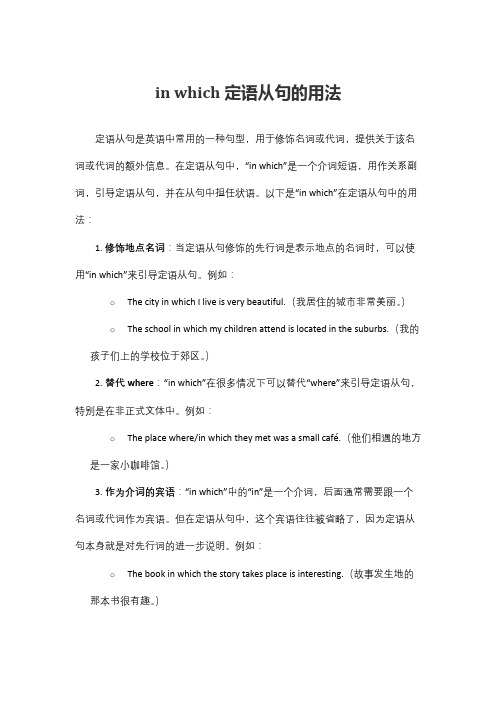
in which定语从句的用法定语从句是英语中常用的一种句型,用于修饰名词或代词,提供关于该名词或代词的额外信息。
在定语从句中,“in which”是一个介词短语,用作关系副词,引导定语从句,并在从句中担任状语。
以下是“in which”在定语从句中的用法:1.修饰地点名词:当定语从句修饰的先行词是表示地点的名词时,可以使用“in which”来引导定语从句。
例如:o The city in which I live is very beautiful.(我居住的城市非常美丽。
)o The school in which my children attend is located in the suburbs.(我的孩子们上的学校位于郊区。
)2.替代where:“in which”在很多情况下可以替代“where”来引导定语从句,特别是在非正式文体中。
例如:o The place where/in which they met was a small café.(他们相遇的地方是一家小咖啡馆。
)3.作为介词的宾语:“in which”中的“in”是一个介词,后面通常需要跟一个名词或代词作为宾语。
但在定语从句中,这个宾语往往被省略了,因为定语从句本身就是对先行词的进一步说明。
例如:o The book in which the story takes place is interesting.(故事发生地的那本书很有趣。
)4.与“at which”和“on which”的区别:“in which”与“at which”和“on which”的区别主要在于它们所修饰的先行词和所表达的时间或位置关系。
例如:o The house in which I live is on a busy street.(我住的房子位于一条繁忙的街道上。
)o The moment at which he arrived was exactly 10 o'clock.(他到达的时刻正好是10点。
定语从句中介词+关系词的用法
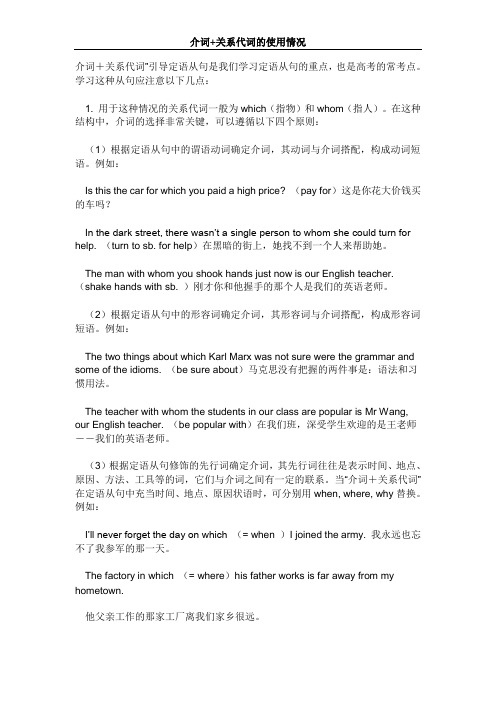
介词+关系代词”引导定语从句是我们学习定语从句的重点,也是高考的常考点。
学习这种从句应注意以下几点:1. 用于这种情况的关系代词一般为which(指物)和whom(指人)。
在这种结构中,介词的选择非常关键,可以遵循以下四个原则:(1)根据定语从句中的谓语动词确定介词,其动词与介词搭配,构成动词短语。
例如:Is this the car for which you paid a high price? (pay for)这是你花大价钱买的车吗?I n the dark street, there wasn’t a single person to whom she could turn for help. (turn to sb. for help)在黑暗的街上,她找不到一个人来帮助她。
The man with whom you shook hands just now is our English teacher. (shake hands with sb. )刚才你和他握手的那个人是我们的英语老师。
(2)根据定语从句中的形容词确定介词,其形容词与介词搭配,构成形容词短语。
例如:The two things about which Karl Marx was not sure were the grammar and some of the idioms. (be sure about)马克思没有把握的两件事是:语法和习惯用法。
The teacher with whom the students in our class are popular is Mr Wang, our English teacher. (be popular with)在我们班,深受学生欢迎的是王老师--我们的英语老师。
(3)根据定语从句修饰的先行词确定介词,其先行词往往是表示时间、地点、原因、方法、工具等的词,它们与介词之间有一定的联系。
介词后面定语从句

介词后面定语从句介词后面定语从句英语最早被中世纪的英国使用,并因其广阔的殖民地而成为世界使用面积最广的语言。
下面是店铺为大家整理的介词后面定语从句,欢迎阅读与收藏。
1.由“介词+关系代词”引导的定语从句主要用于正式文体,在非正式文体中通常将介词放至句末。
如:This is the man to whom I referred. 我指的就是这个人。
This is the man (whom) I referred to. 我指的就是这个人。
2. 直接用于介词后作宾语的关系代词which不能换成that,直接用于介词后作宾语的关系代词whom不能换成who:介词用于句末,则用作宾语的which, whom也可换成that, who,或者省略不同。
如:这是一个我们讨论了许多的问题。
This is a subject about which we have talked a lot.(which不能换成that,也不能省略)This is a subject which we have talked about a lot. 这是一个我们讨论了许多的`问题。
(which可以换成that,也可以省略)3. 关系副词when, where, why根据情况有时可换成“介词+关系代词which”。
如: That is the day when [=on which] he was born. 那就是他出生的日子。
That is the house where [=in which] he lived. 那就是他住过的房子。
That is the reason why [=for which] he must apologize. 那就是他必须道歉的原因。
4. 在很正式的文体中,“介词+关系代词”引导的定语从句可紧缩成“介词+关系代词+不定式”结构。
如:在那儿孩子们有个玩耍的花园。
正:There the children had a garden in which to play. (很正式)正:There the children had a garden in which they could play. (较正式)正:There the children had a garden to play in. (较口语化)注:这类“介词+关系代词++不定式”结构中的介词不能没有,也不能放在句末。
定语从句 第三讲 介词+关系代词的用法

3.“whose + 名词”引导的定语从句可以用 “of which/ of 3.“whose + 名词”引导的定语从句可以用 “of which/ of whom” 来替代whose。例如: whom” 来替代whose。例如: A huge amount of oil spilled, whose effects are still being felt. = A huge amount of oil spilled, the effects of which are being felt. = A huge amount of oil spilled, of which the effects are being felt.
典题直击
1. The man pulled out a gold watch, _______ were made of D small diamonds.(08陕西) A. the hands of whom C. which the hands of
典题直击
2. She showed the visitors around the museum, the construction
_____had taken more than three years. (2011江西卷) C
A. for which
C. of which
能力突破
C 1. Wind power is an ancient source of energy ____ we may return in the near future. (2010上海)
C. all of them
典题直击
C 2. Maria has written two novels, both of ____ have been made into television series. (2012山东)
定语从句的介词用法
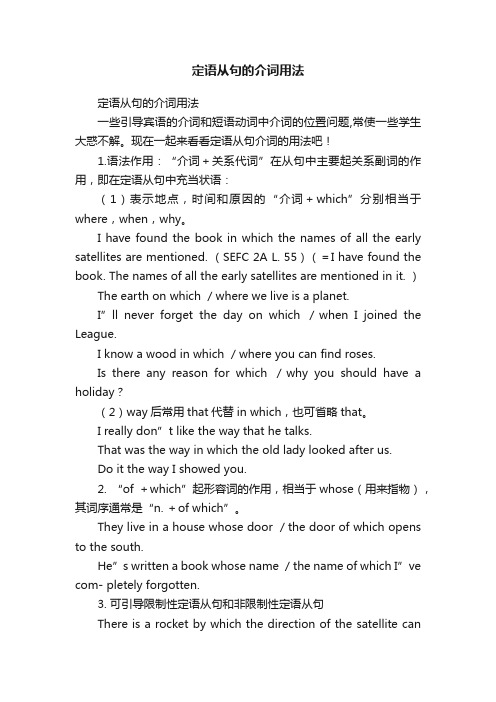
定语从句的介词用法定语从句的介词用法一些引导宾语的介词和短语动词中介词的位置问题,常使一些学生大惑不解。
现在一起来看看定语从句介词的用法吧!1.语法作用:“介词+关系代词”在从句中主要起关系副词的作用,即在定语从句中充当状语:(1)表示地点,时间和原因的“介词+which”分别相当于where,when,why。
I have found the book in which the names of all the early satellites are mentioned. (SEFC 2A L. 55)(=I have found the book. The names of all the early satellites are mentioned in it. )The earth on which /where we live is a planet.I”ll never forget the da y on which /when I joined the League.I know a wood in which /where you can find roses.Is there any reason for which /why you should have a holiday?(2)way后常用that代替in which,也可省略that。
I really don”t like the way that he talks.That was the way in which the old lady looked after us.Do it the way I showed you.2. “of +which”起形容词的作用,相当于whose(用来指物),其词序通常是“n. +of which”。
They live in a house whose door /the door of which opens to the south.He”s written a book whose name /the name of which I”ve com- pletely forgotten.3. 可引导限制性定语从句和非限制性定语从句There is a rocket by which the direction of the satellite canbe changed. (SEFC 2A L. 55)We carefully studied the photos,in which we could see signs of plant disease. (SEFC 2A L. 55)4. 介词的选择(选择介词时须考虑下列情况)1)介词与先行词的习惯搭配There is no way in which it could be brought back to the earth. (SEFC 2A L. 55)(in与way是习惯搭配)2)介词与定语从句中的动词,形容词的习惯搭配These are the wires with which different machines are connected. (be connected with是习惯搭配)The author with whom all of us are familiar will visit our compa-ny. (be familiar with是习惯搭配)3)同形的先行词,或定语从句中的动词,形容词表示不同的含义时,要根据其含义选用不同的介词。
定语从句中介词加关系代词的用法
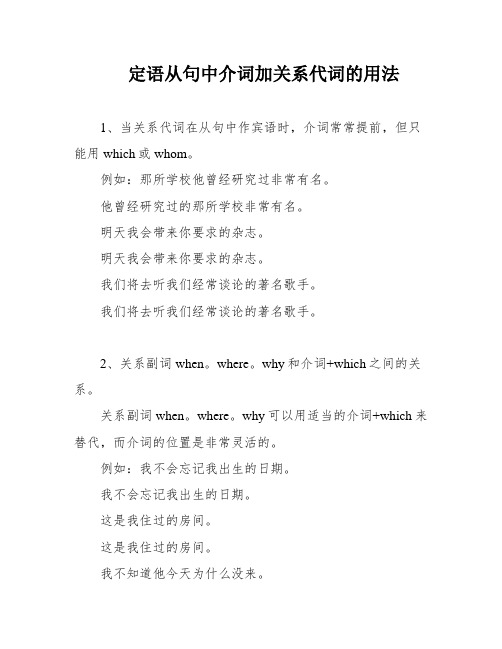
定语从句中介词加关系代词的用法1、当关系代词在从句中作宾语时,介词常常提前,但只能用which或whom。
例如:那所学校他曾经研究过非常有名。
他曾经研究过的那所学校非常有名。
明天我会带来你要求的杂志。
明天我会带来你要求的杂志。
我们将去听我们经常谈论的著名歌手。
我们将去听我们经常谈论的著名歌手。
2、关系副词when。
where。
why和介词+which之间的关系。
关系副词when。
where。
why可以用适当的介词+which来替代,而介词的位置是非常灵活的。
例如:我不会忘记我出生的日期。
我不会忘记我出生的日期。
这是我住过的房间。
这是我住过的房间。
我不知道他今天为什么没来。
我不知道他今天为什么没来。
XXX仍然记得他们住在天津的日子。
XXX仍然记得他们住在天津的日子。
如:The city in which I was born is very beautiful.3.取决于从句中的动词或形容词需要用到的介词。
(V/Adj。
+ pre.)如:This is the person to whom I owe my success。
改写:1.动词短语中的介词一般不可拆开使用,例如“look for”,“look after”,“take care of”等。
例如:This is the watchwhich/that I am looking for.(√)This is the watch for which I am looking.(×)2.若介词放在关系代词前,指人时应使用“whom”,不可使用“who”或“that”;指物时应使用“which”,不能使用“that”;关系代词为所有格时应使用“whose”。
例如:The man with whom you talked is my friend.(√)The man who/that you talked with is my friend.(×)The plane in which we flew to Canada is very comfortable.(√)The plane in that we flew in to Canada is very comfortable.(×)3.“介词+关系代词”前可有some、any、none、both、all、neither、most、each、few等代词或数词。
定语从句介词which的用法
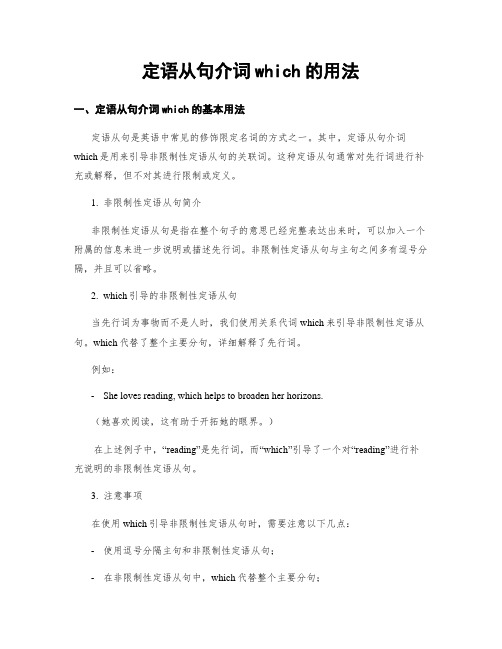
定语从句介词which的用法一、定语从句介词which的基本用法定语从句是英语中常见的修饰限定名词的方式之一。
其中,定语从句介词which是用来引导非限制性定语从句的关联词。
这种定语从句通常对先行词进行补充或解释,但不对其进行限制或定义。
1. 非限制性定语从句简介非限制性定语从句是指在整个句子的意思已经完整表达出来时,可以加入一个附属的信息来进一步说明或描述先行词。
非限制性定语从句与主句之间多有逗号分隔,并且可以省略。
2. which引导的非限制性定语从句当先行词为事物而不是人时,我们使用关系代词which来引导非限制性定语从句。
which代替了整个主要分句,详细解释了先行词。
例如:- She loves reading, which helps to broaden her horizons.(她喜欢阅读,这有助于开拓她的眼界。
)在上述例子中,“reading”是先行词,而“which”引导了一个对“reading”进行补充说明的非限制性定语从句。
3. 注意事项在使用which引导非限制性定语从句时,需要注意以下几点:- 使用逗号分隔主句和非限制性定语从句;- 在非限制性定语从句中,which代替整个主要分句;- 遵守一般的英语语法规则。
4. 使用which引导非限制性定语从句的实例为了更好地理解which引导非限制性定语从句的用法,下面提供一些例子:a) My car, which is blue, is parked outside.(我的车是蓝色的,停在外面。
)这个例子中,“which”引导了一个对“my car”进行补充描述的非限制性定语从句。
b) The documentary, which I watched last night, was very informative.(我昨晚看的这部纪录片非常有启发。
)这个例子中,“which”引导了一个对“the documentary”进行补充描述的非限制性定语从句。
介词引导的定语从句
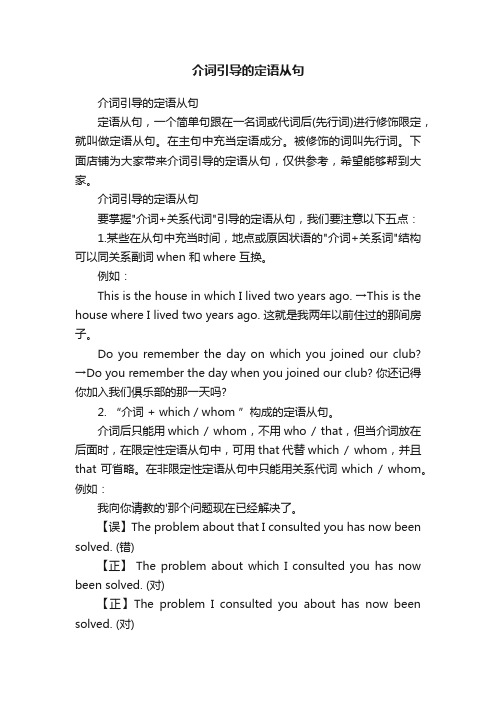
介词引导的定语从句介词引导的定语从句定语从句,一个简单句跟在一名词或代词后(先行词)进行修饰限定,就叫做定语从句。
在主句中充当定语成分。
被修饰的词叫先行词。
下面店铺为大家带来介词引导的定语从句,仅供参考,希望能够帮到大家。
介词引导的定语从句要掌握"介词+关系代词"引导的定语从句,我们要注意以下五点:1.某些在从句中充当时间,地点或原因状语的"介词+关系词"结构可以同关系副词when 和where 互换。
例如:This is the house in which I lived two years ago. →This is the house where I lived two years ago. 这就是我两年以前住过的那间房子。
Do you remember the day on which you joined our club? →Do you remember the day when you joined our club? 你还记得你加入我们俱乐部的那一天吗?2. “介词+ which / whom ”构成的定语从句。
介词后只能用which / whom,不用who / that,但当介词放在后面时,在限定性定语从句中,可用that代替which / whom,并且that可省略。
在非限定性定语从句中只能用关系代词which / whom。
例如:我向你请教的'那个问题现在已经解决了。
【误】The problem about that I consulted you has now been solved. (错)【正】The problem about which I consulted you has now been solved. (对)【正】The problem I consulted you about has now been solved. (对)3. “名词+ 介词+which / whom”引导的定语从句。
定语从句介词用法
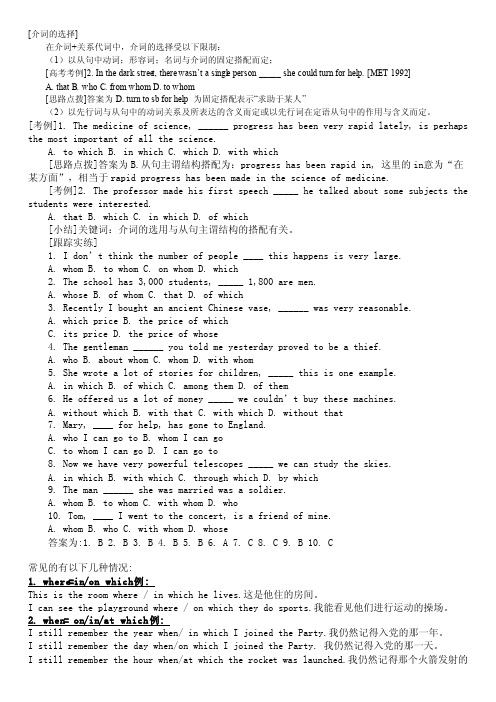
[介词的选择]在介词+关系代词中,介词的选择受以下限制:(1)以从句中动词;形容词;名词与介词的固定搭配而定;[高考考例]2. In the dark street, therewasn’tasingle person _____she couldturn for help. [MET 1992]A. thatB. whoC. from whomD. to whom[思路点拨]答案为D. turn to sb for help 为固定搭配表示“求助于某人”(2)以先行词与从句中的动词关系及所表达的含义而定或以先行词在定语从句中的作用与含义而定。
[考例]1. The medici ne of scienc e, ______ progre ss has been very rapidlately, is perhap s the most import ant of all the scienc e.A. to whichB. in whichC. whichD. with which[思路点拨]答案为B.从句主谓结构搭配为:progre ss has been rapidin, 这里的in意为“在某方面”,相当于rap id progre ss has been made in the scienc e of medici ne.[考例]2. The profes sor made his firstspeech _____he talked aboutsome subjec ts the studen ts were intere sted.A. thatB. whichC. in whichD. of which[小结]关键词:介词的选用与从句主谓结构的搭配有关。
[跟踪实练]1. I don’t thinkthe number of people ____ this happen s is very large.A. whomB. to whomC. on whomD. which2. The school has 3,000 studen ts, _____1,800 are men.A. whoseB. of whomC. thatD. of which3. Recent ly I bought an ancien t Chines e vase, ______ was very reason able.A. whichpriceB. the priceof whichC. its priceD. the priceof whose4. The gentle man ______ you told me yester day proved to be a thief.A. whoB. aboutwhomC. whomD. with whom5. She wrotea lot of storie s for childr en, _____this is one exampl e.A. in whichB. of whichC. amongthemD. of them6. He offere d us a lot of money_____we couldn’t buy thesemachin es.A. withou t whichB. with thatC. with whichD. withou t that7. Mary, ____ for help, has gone to Englan d.A. who I can go toB. whom I can goC. to whom I can goD. I can go to8. Now we have very powerf ul telesc opes_____we can studythe skies.A. in whichB. with whichC. throug h whichD. by which9. The man ______ she was marrie d was a soldie r.A. whomB. to whomC. with whomD. who10. Tom, ____ I went to the concer t, is a friend of mine.A. whomB. whoC. with whomD. whose答案为:1. B 2. B 3. B 4. B 5. B 6. A 7. C 8. C 9. B 10. C常见的有以下几种情况:1. where=in/on which例:This is the room where/ in whichhe lives.这是他住的房间。
- 1、下载文档前请自行甄别文档内容的完整性,平台不提供额外的编辑、内容补充、找答案等附加服务。
- 2、"仅部分预览"的文档,不可在线预览部分如存在完整性等问题,可反馈申请退款(可完整预览的文档不适用该条件!)。
- 3、如文档侵犯您的权益,请联系客服反馈,我们会尽快为您处理(人工客服工作时间:9:00-18:30)。
[介词的选择]在介词+关系代词中,介词的选择受以下限制:(1)以从句中动词;形容词;名词与介词的固定搭配而定;[高考考例]2. In the dark street, there wasn’t a single person _____ she could turn for help. [MET 1992]A. thatB. whoC. from whomD. to whom[思路点拨]答案为D. turn to sb for help 为固定搭配表示“求助于某人”(2)以先行词与从句中的动词关系及所表达的含义而定或以先行词在定语从句中的作用与含义而定。
[考例]1. The medicine of science, ______ progress has been very rapid lately, is perhaps the most important of all the science.A. to whichB. in whichC. whichD. with which[思路点拨]答案为B.从句主谓结构搭配为:progress has been rapid in, 这里的in意为“在某方面”,相当于rapid progress has been made in the science of medicine.[考例]2. The professor made his first speech _____ he talked about some subjects the students were interested.A. thatB. whichC. in whichD. of which[小结]关键词:介词的选用与从句主谓结构的搭配有关。
[跟踪实练]1. I don’t think the number of people ____ this happens is very large.A. whomB. to whomC. on whomD. which2. The school has 3,000 students, _____ 1,800 are men.A. whoseB. of whomC. thatD. of which3. Recently I bought an ancient Chinese vase, ______ was very reasonable.A. which priceB. the price of whichC. its priceD. the price of whose4. The gentleman ______ you told me yesterday proved to be a thief.A. whoB. about whomC. whomD. with whom5. She wrote a lot of stories for children, _____ this is one example.A. in whichB. of whichC. among themD. of them6. He offered us a lot of money _____ we couldn’t buy these machines.A. without whichB. with thatC. with whichD. without that7. Mary, ____ for help, has gone to England.A. who I can go toB. whom I can goC. to whom I can goD. I can go to8. Now we have very powerful telescopes _____ we can study the skies.A. in whichB. with whichC. through whichD. by which9. The man ______ she was married was a soldier.A. whomB. to whomC. with whomD. who10. Tom, ____ I went to the concert, is a friend of mine.A. whomB. whoC. with whomD. whose答案为:1. B 2. B 3. B 4. B 5. B 6. A 7. C 8. C 9. B 10. C常见的有以下几种情况:1. where=in/on which 例:This is the room where / in which he lives.这是他住的房间。
I can see the playground where / on which they do sports.我能看见他们进行运动的操场。
2. when= on/in/at which 例:I still remember the year when/ in which I joined the Party.我仍然记得入党的那一年。
I still remember the day when/on which I joined the Party. 我仍然记得入党的那一天。
I still remember the hour when/at which the rocket was launched.我仍然记得那个火箭发射的时刻。
3. why=for which 例:This is the reason why / for which he was killed.这是他被杀害的原因。
⑴用who代替whom,用that代替which时,介词不能提前。
例:He's the boy who I learned English from.这是我向他学英语的男孩。
This should be the place that Tom sent the parcel to. 这应是汤姆送包裹的地方。
⑵当whom、which省去时介词不能提前。
例:Is he the boy you went there with?他是和你一起去那儿的男孩吗?This is the room he lived in. 这是他住过的房间。
⑶当whom, which作为含有介词的动词短语的宾语时,介词一般来说不能拆开提前。
例:You're the very man whom I'm looking for. 你正是我在找的那个人。
This is the program which he listened to. 这就是他听过的节目。
再看下面几种结构答案补充(一)介词+whose引导的定语从句whose引导定语从句时,可出现创新句型:介词+whose引导定语从句。
解这种定语从句时需弄清从句的动词与先行词、whose后边的名词及定语从句主语之间的关系,并发挥合理想象,不难发现其中正确的逻辑关系。
例:She is the girl to whose father I talked yesterday. 她就是昨天我和其父亲谈话的女孩。
He is the boy for whose boss I work. 他就是我为其老板打工的男孩。
(二)复杂介词+whom/which引导定语从句I stay at the hotel at the back of which is a small garden. 我住在后面有一座花园的旅馆。
(三)数词(不定量数词)/ 含所属关系名词+of whom/which引导定语从句。
例:She has many books, only one of which is interesting. 她有许多书,只有一本是有趣的本单元的语法重点是区别和运用几个表示原因的连词和词组:because, since, as, due to, due to the fact that等。
一、连词的主要用法。
连词是一种在句子之间,短语之间以及名词等其他词语之间起连接作用的虚词,它不能单独作句子的成分。
连词按其意义可分为并列连词和从属连词两大类,对连词的考查主要也是对并列连词和从属连词基本用法的考查。
本单元主要练习使用用来表示双方互为因果,前因后果或前果后因的连词,亦可用这种连词引导原因状语从句,常用的连接词有:because, since, as等。
二、 because, because of, since, as, for, due to, due to the fact that的联系与区别。
1. 联系:以上的词和词组都表示原因,意为“因为;由于”。
2. 区别(1) because通常表示说话人认为这种理由或者原因是听话人所不知道的,后接从句,既可以位于句首也可以放在句中使用,但不与so连用。
如: He didn't attend the meeting because he had too much work to do.(2) because of 与because所表达的意思一样,但其后接单词或短语。
如:He didn't go to school because of illness.(3) since表示的原因是人们已知的事实,常译作“既然”。
如:Since he can't answer this question, you'd better ask someone else.(4) as表示原因与since差别不大,只是语气更弱,多译作“由于”。
如:As I haven't seen the film, I can't tell you what I think of it.(5) for表示因果关系时,只能放在主句之后,不能放在句首。
而且经常是对主句补充说明理由或推断原因。
如:It rained last night, for the ground is wet.⑹ due to是说明原因的短语,to 为介词,因此due to 后接名词或名词性短语。
如:Due to the benefits of garlic, he decided to eat it more often.(7) due to the fact that 与due to意思相同样,但due to the fact that后接从句。
如: We stayed inside the house due to the fact that the weather was cold.单项选择。
